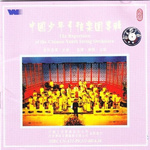姓名: WangWeiping 英文名:- 性别:- 国籍:- 出生地:- 语言:- 生日:- 星座:- 身高:- 体重:-
Born in Xi’an, former capital of the Empire during the Tang dynasty (618-907), she studied the pipa with her mother Guo Xiuzhen then in the Xi’an and Beijing music conservatories. Her talent was early remarked and she awarded national prizes, of which the Central Television award.
She has given many concerts in China, Hong-Kong, Macao and in Europe.
Pipa-soloist of the "Shaanxi Song and Dance Ensemble", she has particularly participated in 85 and 90 to many representations across Japan. She played for the Emperor and Empress of Japan during their visit of China in 1992.
In Paris, she was invited for a solo concert at the “ Thére de la Ville” and at “Radio-France” where a C.D. has been recorded under Ocora label.
She regularly plays within the traditional Chinese music ensemble “Fleur de Prunus” directed by Franis Picard and within the baroque ensemble “XVIII-21” of Jean-Christophe Frisch.
She also plays contemporary music : creation of “Noich” by Fabien Tehericsen with the Quatuor Arditti, creation at The Louvre of a piece of Xu Yi with the "2E2M" ensemble, belgium creation of the pipa and orchestra concerto of Tan Dun with the "Ensemble Musiques Nouvelles". In year 2002, she played in China with the Cergy-Pontoise Conservatory ensemble.
Wang Weiping composes herself some pieces putting in value the capabilities of her instrument.
She came to France to study lyric singing with Xin RuFeng and Alain Rigo at the “Ecole Normale de Musique” (Paris).
"Like the antic princess Wang Zhaojun who, exiled after the Great Wall, accompanying herself with the pipa, song the nostalgia of her mother land, Wang Weiping put her elaborated technique at the service of the greater musicality. Interpreting the thousand old pieces which resounded in the imperial court, she evokes the tumult of the wars as well as the odes to the moon light. She is also a remarkable singer, as expressive with Cantonese songs of the thirties as in the works celebrating the Nature, composed by the Tang dynasty poets." (Franis Picard)











